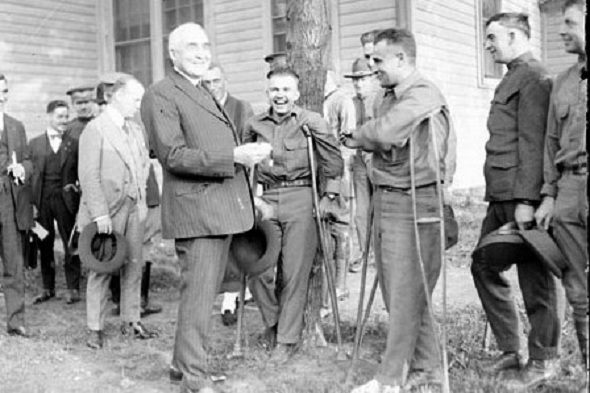The original ‘smoke-filled room’
By John R. Schmidt

The original ‘smoke-filled room’
By John R. SchmidtThe big news the next two weeks will be the national political conventions. Chicago has hosted 25 of these gatherings, far more than any other city. That makes it an appropriate time to recall a few historic Chicago conventions, this week the Republicans, next week the Democrats.
We begin with 1920, when the President of the United States was chosen in a suite at the Blackstone Hotel.

In 1920 Democrat Woodrow Wilson was finishing up his second term in the White House. The Republican Convention was being held at the Chicago Coliseum that year, and it looked like happy days for the GOP. The country was in the mood for change.
Today’s party conventions are nothing more than pep rallies – by the time the opening gavel is banged, one candidate has locked up the nomination. That wasn’t the case in 1920. Back then local party bosses controlled things. Several roll-call ballots were usually needed to pick a nominee.
When the Republicans assembled on June 8th, there were two front-runners–General Leonard Wood and Illinois Governor Frank Lowden. The balloting began. Neither man could get a majority. The party elders called a recess, then met behind closed doors at the Blackstone to break the deadlock.
Warren G. Harding was a Senator from Ohio. He was one of the minor candidates, and few people outside his state had ever heard of him. His main selling point seemed to be that he “looked like a President.”

Harding’s campaign manager, Harry Daugherty, had predicted the deadlock. Daugherty said that at about 2 in the morning of the convention’s fourth day, 15 or 20 men would be sitting around a table in a smoke-filled room, bleary-eyed from heat and lack of sleep. The men would be looking for a compromise candidate.
“At that decisive time,” Daugherty declared, “the friends of Senator Harding will suggest him.”
Daugherty was quite a prophet. After several hours of wrangling, the party bosses summoned Harding to the power suite at the Blackstone. It was just after 2 a.m. on the fourth day.
Harding was asked if there were anything in his past that might embarrass the party. He said there was not. He didn’t mention that he’d fathered a child outside his marriage–a scandalous act in 1920.
So the bosses annointed Harding. He was quickly nominated, and won the November election in a landslide. When he died in office in 1923, he was one of the most popular presidents in history.
And today–even with all the restrictions on smoking – we still call a private gathering of political fixers a “smoke-filled room.”
